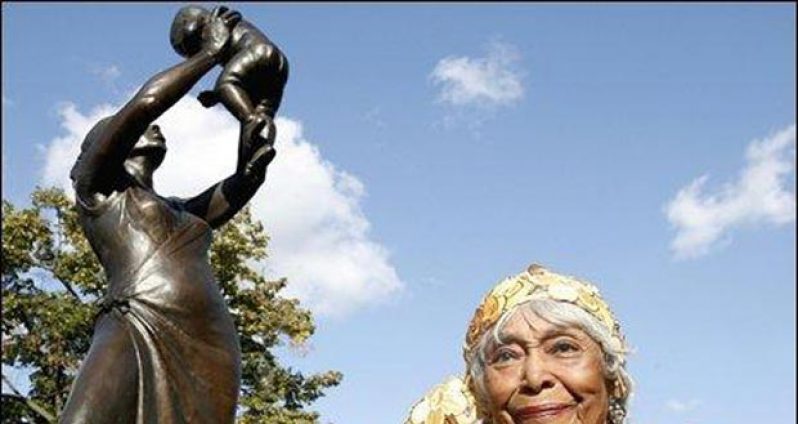(1919 – 2013)
ON November 19, 2013, Guyana lost another literary luminary: Cécile Nobrega. She died at age ninety-four, five years after the ‘Bronze Woman Statue’ was unveiled in Stockwell Memorial Gardens, South London, and four decades after the poem that inspired the statue was written by Nobrega in Guyana.
The poem titled, ‘Bronze Woman’, was published in Nobrega’s first book of verses, ‘Soliloquies’. ‘Bronze Woman’, the first poem in the book, was about the “stalwart woman-man/strength in your heart/and love in your limbs” who prevailed and continues to achieve against great odds.
The Bronze Woman Monument, a seven-foot statue of a woman holding a young child aloft, is the physical manifestation of that poem, paying tribute to women of Guyana and the Caribbean who suffered ‘massa-day’.
The effects of ‘massa-day’ was still wreaking havoc when Cécile Nobrega was born in 1919 in Georgetown, British Guiana. Born to Imelda and Canon W. G. Burgan, they managed on a ‘limited stipend’.
Her father used to write articles on life in the countryside for the Argosy newspaper under the pseudonym, ‘Rusticious’. Her mother, who learnt music while attending St. Rose’s High, was a popular singer of her day, and a hit at music festivals.
The influence of music on the life of young Cécile goes a generation back to her maternal grandmother, Husbands, who used to import classical gramophone records through Pradasco Bros. on Hinck Street, Georgetown.
Cécile used talk about one of the records her grandmother brought for her because she was named after the singer: It was ‘Autumn’, by Cécile Chaminade.
Cécile went on to write and compose songs, winning a few awards along the way. Her most popular song was ‘Twilight’, which opens in the following manner:
‘I dance upon the brink of day/And try to keep the night away’.
She has covered much ground leading to her twilight years, making a name for herself as a poet, playwright, composer, potter, social worker, textbook writer and educator.
She has covered much ground leading to her twilight years, having been formally educated at The Bishops’ High School, British Guiana; Hockerill College of Education, UK; the Institute of Education, London University; and informally through one of her hobbies, which is travelling.
As a past member of the Women’s League of Social Service, Cécile represented this country at the Conference of Caribbean Women’s Association held in Trinidad. Incidentally, she was married in Trinidad (1943) to Romeo Anthony Nobrega, a born Guyanese who was attached to the Caribbean Forces during the Second World War. She was also a member of the International Alliance of Women, UK, and was a member the Guyana Women Artists Association, UK as well.
As a writer, Cécile Nobrega falls within that first wave of Guyanese women writers which included Sheila King; Syble Douglas; Rajkumari Singh; Celeste Dolphin; B. Zorina Ishmael; Jacqueline DeWeever; Joy Allsopp; Margaret E. Bayley; Edwina Melville; Evadne D’Oliveira; and Doris Harper-Wills.
Some of those women were active in the very robust Guyana Writers’ Group. Many of them were talented in more than one genre of writing, but, importantly, most of them produced children’s literature, and quite a few were playwrights.
The Guyana Writers’ Group produced ‘Voices of Guyana’, a collection of poems edited by Donald Trotman, in commemoration of International Human Rights Year, 1968. Cécile was also featured in the first Guyanese anthology of stories, ‘Stories From Guyana’.
While she was a member of the Guyana Chapter of International PEN, Cécile represented this country at the PEN Congress in Oslo, Norway.
She was also a good ambassador of Guyana on other occasions, including representing the country at the International Children’s Theatre Conference held in London in 1964.
As one of the few women playwrights at the time, her play, ‘Stabroek Fantasy’, was quite an achievement. It would be useful to bear in mind that theatre was always struggling, despite the exploits of the British Guiana Dramatic Society, the Georgetown Dramatic Club, and the feats of Norman E. Cameron.
As an educator, Cécile was President of the Kindergarten Section of the Guyana Teachers’ Union, and editor of ‘You’ magazine for the Parish of St. Sidwell’s in Lodge. She also taught Music and Language.
Apart from her first collection published in Guyana, Cécile had published other books of poetry including, ‘Japan, The Butterfly’, an ode to that country with which she fell in love through one of her hobbies, which was studying the history of Japan. She revealed that that was another of her visions, “…in the light of what we know today of Japan, the Ode can be regarded as a prophesy, written, as it was, over 25 years ago!” Cécile was a member of the Japan Society, London.
When she migrated to London in 1969, she took with her a solid foundation in various fields of endeavour on which to build. But it wasn’t easy; not that she ever had it easy. Her philosophy could be found in her poem, ‘Right to Life’, where she points out, ‘however great the hurricane/the smiling grass/bobs up its head again’.
The poem, ‘Bronze Woman’, contributed to the shaping of our literature, and ‘Bronze Woman Statue’ is a monumental way of preserving our literary heritage.
Rest in Peace, Cécile. (To respond to this author, either call him on (592) 226-0065 or send him an email: oraltradition2002@yahoo.com)
WHAT’S HAPPENING:
• ‘An Introduction to Guyanese Literature’ is now available at the National Library. This book is an up-to-date guide, featuring significant literary landmarks, from the 16th Century to the new millennium. This 150-page book, including over 100 photographs, is an attempt at bringing to the fore little known facts about lesser known aspects of our literature. The big books, the big authors and the big success stories in Guyanese Literature are also featured.


.jpg)










